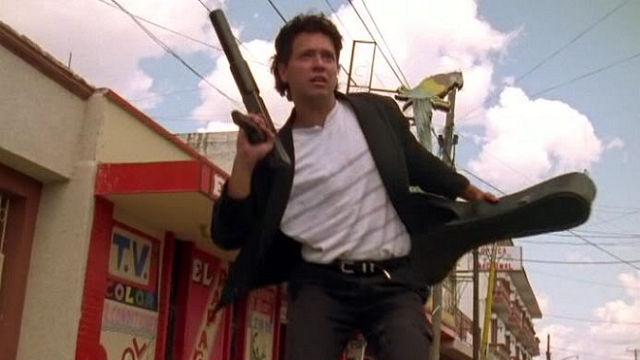Alan W Pollack described “Octopus’ Garden” as “naive”, and that’s very much the word to describe the appeal of Robert Rodriguez’ debut feature, El Mariachi. What centers the film is a strong, downright archetypal dramatic engine, one that draws on one of the few things Rodriguez gives half a fuck about: his Latino heritage.
Our hero, El Mariachi (impossible to say in any way other than how the narrator of the trailer says it), wanders into a small town in Mexico with the goal of becoming a professional musician. At the same time, ruthless criminal Azul is seeking revenge on drug lord Moco for getting him arrested. These two strands, with clear and simple characters who definitively want one thing (with our poor hero wanting something fairly unique in the action/Western genre), give the story a powerful drive that not only overcomes the severe technical limitations, but turns them into personality quirks.
Famously, the film was shot for $7,255 over twenty days in Mexico, a process Rodriguez delves into in his book Rebel Without A Crew. It was shot silently with an almost entirely amateur cast, who recorded lines into a mike after the day’s shoot to be dubbed in later; Rodriguez transferred the footage to video because he found it easier to edit in (his rant about film in Rebel must have made Tarantino die a little inside). This process factored into his creative decisions. Rodriguez relies heavily on closeups connected by cuts to draw attention away from his limited resources; he cuts wildly to hide errors and dubbed lines that didn’t match up to lips; he develops a technique he’d later call “the dog”, in which he puts someone in a corner so he can use them as coverage to connext two different takes.
Rodriguez’s Tex-Mex film nerd personality bleeds through these limitations and cliches. Like him, his hero is a scrappy, resourceful improviser who wants to be a great artist and just barely skates by on limited resources – one of my favourite moments in the film is when he’s trying to get a job early on, and is rejected in favour of some asshole playing generic crap on a keyboard. The big villain, Moco, was part of Rodriguez’s desire to have a white American villain to contrast with his Latino hero, but he’s also an example of a rich, lazy bastard who relies mainly on other people to do work for him, presumably the worst kind of person Rodriguez could think of at the time. And technically, the film throws in every cool thing Rodriguez saw in every film, from dramatic dollying on El Mariachi’s panicked face to slow motion during action scenes to a kickass hero shot of El Mariachi walking with his gun.
Originally, Rodriguez intended to distribute the film via the Mexican home video market, and it was only through both Mariachi-esque luck and Mariachi-esque tenacity that he found it falling into the Hollywood system, impressing Hollywood bigshots who were delighted by how expensive it looked for so little money. He was given the resources to remaster it in 35mm and send it out to film festivals, his first step into a whole new world.

